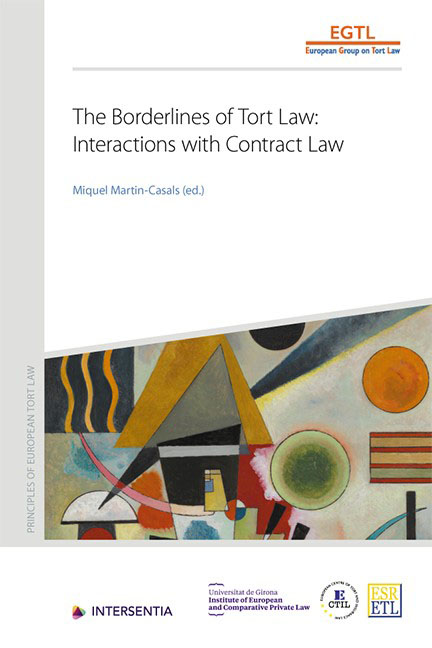Book contents
Germany
Published online by Cambridge University Press: 15 November 2019
Summary
QUESTIONS
TRACING THE BORDERLINES
A. DISTINCTION BETWEEN TORT AND CONTRACT
In theory, German law draws a strict distinction between contract law and tort law. The main reason is the different function of both areas of law: contract law depends on and secures the agreement between two or more parties. It is a private act based on their free will that creates binding obligations between them. Tort law on the contrary formulates rules that every member of the society which these rules enacted must observe. While contract law aims at giving the private agreement effect within reasonable borders, tort law aims in general to prevent activities which are unacceptably detrimental to other members of society and to award compensation where damage has occurred as a result of such activities. It defines, as has rightly been said, the conditions under which a person should generally become liable or remain free from liability.
The German Civil Code (Bürgerliches Gesetzbuch, BGB) follows a peculiar line: it assembles together contract and tort law – and other obligations – in its second Book: Law of Obligations (Recht der Schuldverhältnisse) and regulates as much as possible in abstracto what all kinds of obligations including contract and tort have in common (general part of the law of obligations). Some of the provisions of this general part of obligations exclusively address contracts, while many others are formulated in an abstract manner to theoretically apply to the other obligations as well. Further, in the special part of the law of obligations, many types of contracts and also torts are dealt with in separate chapters. It is thus a rather complex picture that the German regulation of contract and tort law presents.
B. EXISTENCE OF A ‘GREY ZONE’?
German law acknowledges a ‘grey zone’ between contract and tort law in the sense that provisions which normally require a contract are applied to certain tort-like situations although no contract exists. Since the modernisation of the German law of obligations in 2002, §311 (2) and (3) BGB provide for a specific regulation for these cases which the Civil Code terms ‘rechtsgesch äftsähnliche Schuldverhältnisse’ (‘obligations similar to legal transactions’).
- Type
- Chapter
- Information
- The Borderlines of Tort LawInteractions with Contract Law, pp. 171 - 212Publisher: IntersentiaPrint publication year: 2019

